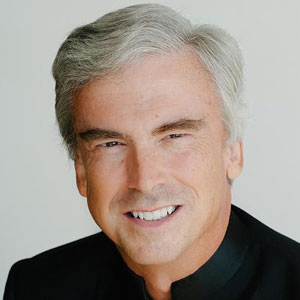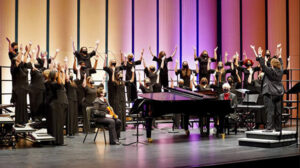THE PLANETS IN HI-DEF
Jerry Junkin, Artistic Director & Conductor

In his 28th season as Artistic Director and Conductor of the Dallas Winds, Jerry Junkin is recognized as one of the world’s most highly regarded wind conductors. He has served as Music Director and Conductor of the Hong Kong Wind Philharmonia since 2003, and Principal Guest Conductor of the Senzoku Gakuen College of Music Wind Symphony in Tokyo since 2007. Additionally, 2021-2022 marks his 34th year on the faculty of The University of Texas at Austin, where he holds the Vincent R. and Jane D. DiNino Chair for the Director of Bands. There, he also holds the title of University Distinguished Teaching Professor. Previously, he served on the faculties of both the University of Michigan and the University of South Florida. In addition to his responsibilities as Professor of Music and Conductor of the Texas Wind Ensemble, he serves as Head of the Division of Conducting and Ensembles and teaches courses in conducting and wind band literature. He is a recipient of multiple teaching awards, and students of Mr. Junkin hold major positions throughout the world.
Performances under the direction of Mr. Junkin have won the praise of such notable musicians as John Corigliano, David Del Tredici, Gunther Schuller, Karel Husa, William Kraft, Jacob Druckman and Michael Colgrass, among many others. Mr. Junkin has released over 30 compact disc recordings for the Reference, Klavier and Naxos labels. The New York Times named his release on the Reference Recordings label, Bells for Stokowski, one of the best classical CD’s of the year. His performance of Circus Maximus with The University of Texas Wind Ensemble was released on the world’s first Blu Ray audio disc in 5.1 surround sound by Naxos and was nominated for a GRAMMY. During the summer of 2014, he led The University of Texas Wind Ensemble on a four week tour around the world.
Mr. Junkin is an enthusiastic advocate of public school music education, having conducted All-State bands and festivals in forty-eight states and on five continents. He spends his summers in residence at the Interlochen Arts Camp in Michigan, as well as appearing at major music festivals throughout the world.
Mr. Junkin has served as President of the Big XII Band Director’s Association and is a member of the Board of Directors of The John Philip Sousa Foundation, is Past-President of the American Bandmasters Association, and is Past President of the College Band Directors National Association. Regularly making guest appearances with ensembles such as the Tokyo Kosei Wind Orchestra and the Taipei Symphonic Winds, he continues to conduct throughout the United States in addition to multiple appearances in Japan, China, and Europe. In 2005, he was presented the Grainger Medallion by the International Percy Grainger Society in recognition of his championing of Grainger’s works, and he has received numerous career awards from Kappa Kappa Psi, Phi Beta Mu, and the Midwest Clinic, among others. Mr. Junkin is a Yamaha Master Educator.
Tuesday, March 15, 2022 – 7:30pm
Meyerson Symphony Center + Livestream
Program
Sunrise from Also Sprach Zarathustra [1:45]
Richard Strauss
Close Encounters of the Third Kind [7:55]
John Willliams, arr. Stephen Bulla
Polka and Fugue from Schwanda the Bagpiper [7:50]
Jaromir Weinberger
– INTERMISSION –
The Planets [50:00]
Gustav Holst, arr. Merlin Patterson
- Mars, The Bringer of War [7:56]
- Venus, The Bringer of Peace [8:20]
- Mercury, The Winged Messenger [4:18]
- Jupiter, The Bringer of Jollity [8:00]
- Saturn, The Bringer of Old Age [9:23]
- Uranus, The Magician [5:19]
- Neptune, The Mystic [6:53]
The Women's Chorus of Dallas
 The Women’s Chorus of Dallas is one of the nation’s finest women’s choruses, known for a commitment to excellent music and giving back to the community. Under the leadership of Artistic Director Melinda Imthurn, in her 17th season with the Chorus, TWCD regularly performs three season concerts and multiple community events each year, including their signature concert series, Voices of Women, each March.
The Women’s Chorus of Dallas is one of the nation’s finest women’s choruses, known for a commitment to excellent music and giving back to the community. Under the leadership of Artistic Director Melinda Imthurn, in her 17th season with the Chorus, TWCD regularly performs three season concerts and multiple community events each year, including their signature concert series, Voices of Women, each March.
TWCD singers use their voices to give back in many ways, including performances for clients of and to raise funds for partner agencies that serve the community in AIDS awareness, domestic violence prevention, human rights, and LGBTQ+ concerns.
Melinda Imthurn, Artistic Director
Will Varner, Assistant Artistic Director, Accompanist
Singers:
- Maria Acon
- Kiana Afkami
- Carrie Anspach
- Katina S. Brooks
- Kim Clarke
- Susan Daniels
- Jessica Dobbs
- Edie Fletcher
- Christina Flores
- Kim Foster
- Avery Hendrickson
- Julie Hudgens-Haney
- Georgia Jenkins
- Vanessa Kincheloe
- Crystal Koe
- Tami Moar
- Cara Monahan
- Katie Potere
- Christina Reeves-Shull
- Ursula Villarreal
- Ariel Wentworth
- Rachel Williams
Dallas Winds Personnel
PICCOLO
Jennifer Wheeler
Martin Godoy
FLUTE
Margaret Shin Fischer, Principal
Jennifer McElroy
Martin Godoy
Jennifer Wheeler
Katie Velasquez
Sarah Deay
OBOE
Sharon Lacey, Principal
Kelly Diaz
Ashley Flores
ENGLISH HORN
Susannah Hilliard
E♭ CLARINET
Mary Druhan
B♭ CLARINET
Deborah Ungaro Fabian, Concertmaster
Sharon Knox Deuby, Associate Principal
Mary Druhan
Alex Yeselson
Ricky Reeves
Jeanie Murrow
Bonnie Dieckmann
Andre Canabou
Mark Arritola
BASS CLARINET
Mickey Owens
CONTRA CLARINET
Robin Owens
Basil Bouras
BASSOON
Marty Spake, Principal
Spencer Wilson
Jazmyn Barajas-Trujillo
CONTRABASSOON
Jeff Strong
ALTO SAXOPHONE
Donald Fabian, Principal
David Lovrien
TENOR SAXOPHONE
Roy E. Allen
BARITONE SAXOPHONE
John Sweeden
HORN
David Lesser, Principal
Reese Farnell
Heather Test
Jason Hofmeister
Mark Jansen
Sarrah McCoy-Black
TRUMPET
Brian Shaw, Co-principal
Tim Andersen, Co-principal
James Sims
Peter Stammer
Richard Adams
Daniel Kelly
Jared Broussard
TROMBONE
Jonathan Gill, Principal
Amanda Hudson
Jacob Muzquiz
BASS TROMBONE
Barney McCollum
EUPHONIUM
Grant Jameson, Principal
David Strand
TUBA
Jason Wallace, Principal
Nick Beltchev
STRING BASS
Andrew Goins
Ben Mitchell
PIANO
Brian Allison
HARP
Naoko Nakamura
Mallory McHenry
ORGAN
Jordan Smith
TIMPANI
Steve Kimple
PERCUSSION
Roland Muzquiz, Principal
Lane Harder
Brandon Kelly
Bill Klymus
Jon Lee
Steve McDonald
Michael McNicholas
PERSONNEL MANAGER
Gigi Sherrell Norwood
MUSIC LIBRARIAN
Chrystal Stevens
EQUIPMENT MANAGER
Roland Muzquiz
TECHNICAL DIRECTOR
Ramon Musquiz
STAGE MANAGER
Michael McNicholas
FOUNDER / EXECUTIVE DIRECTOR
Kim Campbell
EXECUTIVE ASSISTANT
Grace Lovrien
DIRECTOR OF CONCERT OPERATIONS
Gigi Sherrell Norwood
DIRECTOR OF EDUCATION
Todd Toney
BOOKKEEPER
Lenore Ladwig Scott
Program Notes
Richard Georg Strauss
(June 11, 1864-September 8, 1949)
Strauss was a musical prodigy whose career spanned the late romantic and early modern eras of classical music. He grew up in a musical family, and got his earliest musical training from his father, who was principal horn for Court Opera in Munich. Strauss wrote his first composition at age six, and by his early teens he was composing piano and chamber ensemble pieces, most of which have been lost to history. He didn’t begin to find his mature musical style until 1885, at age 21. A spate of his best-known works followed over the next eleven years: the tone poem Don Juan in 1888; Death and Transfiguration in 1889; Till Eulenspiegel’s Merry Pranks in 1895; and Also Sprach Zarathustra in 1896. Over the course of his career, he wrote operas, lieder, tone poems, and works for special occasions.
Although Also Sprach Zarathustra has been a staple of the orchestral repertoire since its premiere in November 1896, the opening fanfare, which Strauss called “Sunrise” became widely popular when filmmaker Stanley Kubrick used it in the soundtrack of his 1968 film 2001: A Space Oddyssey. Throughout the following decade, Elvis Presley used it to open his live concerts.
John Towner Williams
(b. February 8, 1932)
One of the most popular and successful composers of the modern age, John Williams has won five Academy Awards, 17 Grammy Awards, three Golden Globes, two Emmys and five awards from the British Academy of Film and Television Arts, among others. Best known for his film scores and ceremonial music, Williams is also a noted composer of concert works, and a renowned conductor.
IMDb lists Williams as the composer for 146 films, with three more in various stages of productions. His credits include Saving Private Ryan, Lincoln, Amistad, Seven Years in Tibet, The Lost World, Rosewood, Sleepers, Nixon, Sabrina, Schindler’s List, Jurassic Park, Home Alone, Far and Away, JFK, Hook, Presumed Innocent, Always, Born on the Fourth of July, the Indiana Jones series, The Accidental Tourist, Empire of the Sun, The Witches of Eastwick, the Star Wars series, E. T.: The Extra-Terrestrial, Superman, Close Encounters of the Third Kind, Jaws, and Goodbye Mr. Chips among many others.
In Stephen Spielberg’s second feature film, Jaws, Williams took two notes, and created an identifiable villain long before the actual shark ever appeared onscreen. With Close Encounters of the Third Kind, Williams expanded his theme to five notes, and created a new language the film’s scientists could use to communicate with the aliens of the film’s giant Mother Ship. Williams also used the five-note theme throughout the score, making it an instantly recognizable musical motif and an icon of popular culture. The movie’s soundtrack was released on vinyl, 8-track tape, and audiocassette, and peaked at #17 on U.S. Billboard album chart. Although the music lost the Oscar for best film score to Star Wars, released the same year, it won two Grammy Awards, for film score and instrumental composition.
Jaromir Weinberger
(January 8, 1896 – August 8, 1967)
Jaromir Weinberger was born in Czechoslovakia and grew up on his grandparent’s farm, where he eagerly absorbed Czech folksongs and folklore. He began playing the piano at age five and was composing by the age of ten. He studied at the Prague Conservatory and later in Leipzig.
As the director of the Czechoslovakian National Theatre in 1926, he completed Schwanda the Bagpiper, a two-act opera that has been performed in seventeen languages and in some of the world’s finest venues. Two separate musical themes from the opera were joined to form a concert work, the “Polka and Fugue,” that is now heard more often than the opera itself.
Weinberger left Czechoslovakia in 1939, one step ahead of the Nazis. He continued to teach and compose in the United States, moving from New York to Ohio, and later Florida. He died in 1967.
Gustav Holst
(September 21, 1874-May 25, 1934)
Despite his German name, Gustav Holst was an English-born composer who is best known for his orchestral work, The Planets. Holst grew up learning piano, organ, and trombone, and began writing music when he was twelve, although his father tried to discourage his interest. Young Gustav eventually convinced his father to let him study at the Royal College of Music, where he immersed himself in the music of everyone from Henry Purcell (1659-1695) to Richard Wagner (1813-1883). Holst also soaked up philosophy from William Morris and George Bernard Shaw, and made a life-long friend of fellow composer Ralph Vaughan Williams.
Holst and Vaughan Williams became critique partners, playing their unfinished works for each other and arguing philosophy late into the night. In the early 1900s, when a resurgent interest in British folk music swept musical circles, Vaughan Williams would coerce Holst into song-collecting expeditions—a pursuit Holst did not enjoy nearly as much as Vaughan Williams did. This same passion for song collecting influenced the young Australian composer, Percy Grainger.
Although Holst was deeply respected as a music teacher, his reputation as a composer languished. His operas did not win the prestigious awards he anticipated, and his choral works got only a lukewarm reception. With each professional setback, Holst would take off on a hiking trip to nurse his wounds, hoping to discover a new source of inspiration. On one such trip Holst discovered astrology, with two results: he would happily cast his friends’ horoscopes for the rest of his life, and he found the inspiration to write a suite in seven movements called The Planets. It premiered in 1918 and remains Holst’s best-known and most beloved work.
–Program notes written by Gigi Sherrell Norwood

